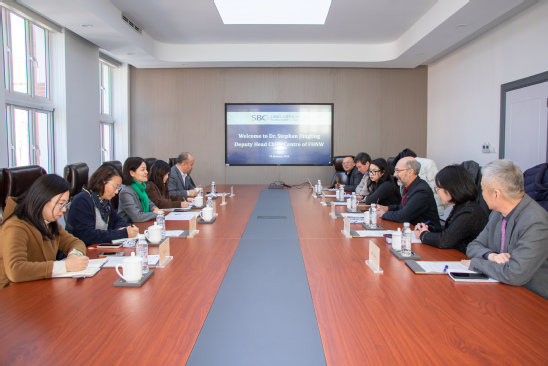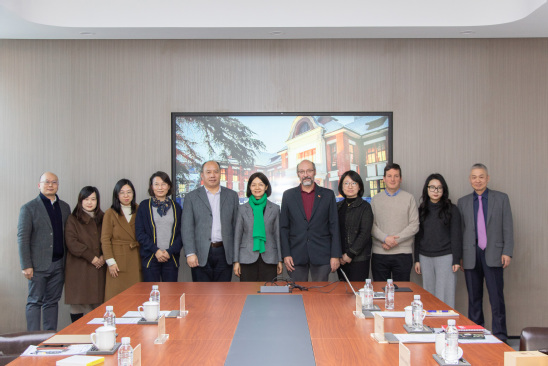On the afternoon of January 10th, Stephan Jüngling, Deputy Head China Centre of School of Business, University of Applied Sciences and Arts Northwestern Switzerland (FHNW), visited SBC. CAI Yonglian, Vice President of USST and Dean of SBC, met the guest at the administrative meeting room.
Cai Yonglian welcomed Stephan Jüngling on behalf of USST, providing a brief introduction to the university’s background and SBC’s “one-to-n” consortium model, highlighting the achievements of this model. She emphasized that, as a university with a profound cultural heritage and a strong emphasis on science and engineering, USST has been exploring international exchange pathways and models through multi-layered and multi-channel cooperation, innovating its education system and mechanisms. This has led to the formation of a diversified and internationalisation development path. Since its establishment in 2006, SBC has had frequent cooperation and exchanges with British partner universities in the higher education field, yielding fruitful results. She hoped that this visit would serve as an opportunity to leverage the strengths of both sides, focusing on the dissemination of artificial intelligence technology and culture. The aim is to engage in more in-depth and broad cooperation in areas such as high-level projects, talent development, faculty and student exchanges, scientific research, and resource sharing, to achieve more fruitful outcomes in various fields and further promote high-quality internationalized development in both institutions.
Stephan Jüngling expressed his gratitude for the warm reception and introduced the University of Applied Sciences and Arts Northwestern Switzerland, reviewing the history of exchanges and cooperation between the two institutions. He praised the significant achievements USST and SBC h**e made in international exchanges, the construction of international cooperation platforms, and the exploration of international exchange models in recent years. He pointed out that both institutions share many similarities in their international education philosophies and that there is broad space for cooperation in areas such as collaborative education programs, professional development, talent cultivation, and faculty and student exchanges. He looked forward to deepening cooperation in areas such as high-level projects, scientific research, student exchanges, faculty visits, international summer schools, and cultural exchanges.
During the meeting, both sides engaged in a productive discussion on how to strengthen resource sharing and achieve complementary advantages. In-depth exchanges were held on topics such as collaborating with senior students on graduation design projects, organizing international summer schools, and facilitating faculty and student exchange programs. A consensus on cooperation was reached, laying a solid foundation for further collaboration.


Contribution: Sino British International College

